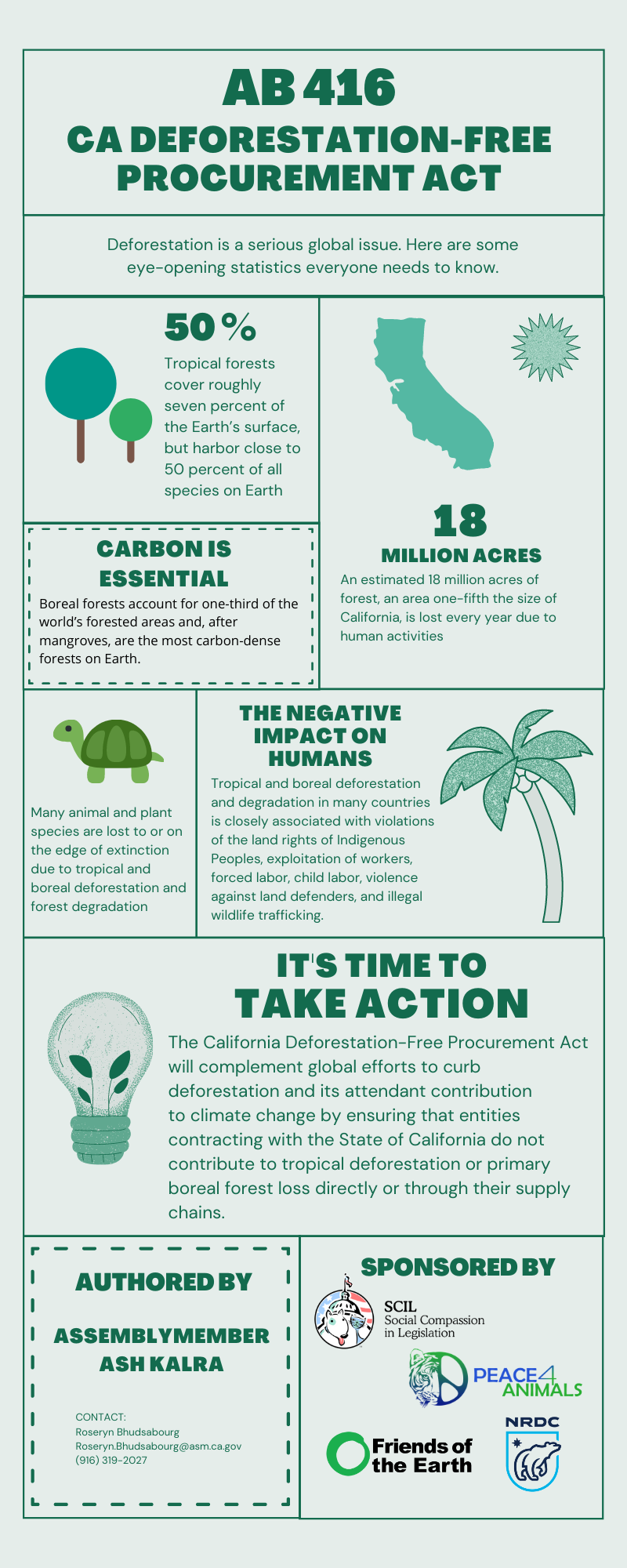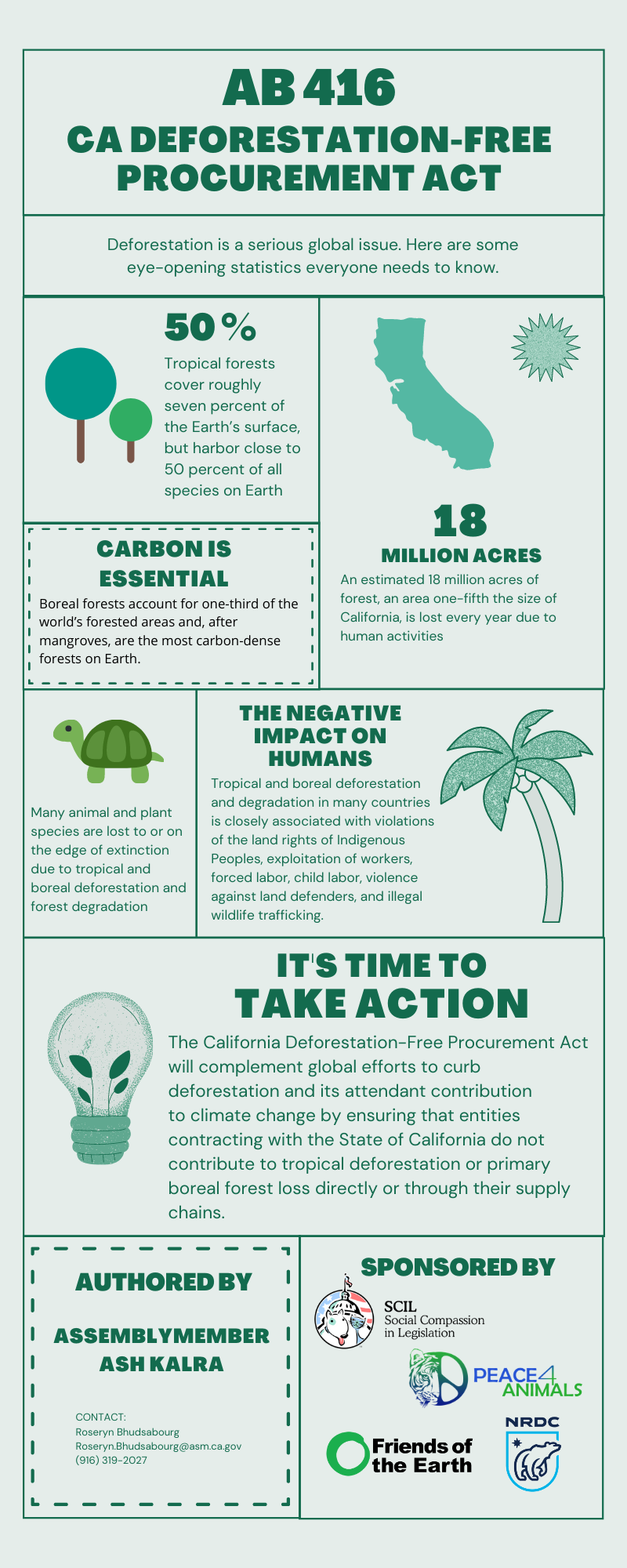
If passed, California would be poised to become the first in the nation to require state procurement contracts to certify that operations and supply chains are not contributing to tropical or boreal deforestation
SACRAMENTO – Following a year of a record-breaking number of devastating fires in tropical forests around the world and the continued degradation of boreal forests in North America, Assemblymember Ash Kalra (D-San Jose) and bill co-sponsors, Friends of the Earth, the Natural Resources Defense Council, Peace 4 Animals, and Social Compassion in Legislation, today announced the introduction of Assembly Bill (AB) 416, the California Deforestation-Free Procurement Act.
“By introducing this bill, we’re giving California the opportunity to take real leadership in the fight against tropical and boreal deforestation and primary forest degradation by making our purchases – and our global impact – more transparent, more sustainable and more ethical,” said Assemblymember Kalra. “AB 416 asserts our California values and extends environmental leadership to the protection of tropical and boreal forests, sending a powerful signal to global markets that illegal and destructive commodity-driven deforestation will no longer be tolerated.”
If passed, all California state contracts involving commodities that put tropical and primary boreal forests at risk, such as palm oil, soy, cattle, rubber, paper/pulp and timber, would require contractors to maintain a No Deforestation, No Peat, No Exploitation (NDPE) policies, and provide evidence that their operations in sensitive tropical and boreal regions are not linked to forest destruction and degradation or abuses of indigenous peoples’ rights.
Environmental advocates and industry leaders alike agree that such policies are the best way to prevent ongoing forest destruction. A version of the bill introduced in 2019 achieved strong bi-partisan support but failed to pass the Senate Appropriations Committee.
The world’s forests are in crisis. Tropical forests cover roughly seven percent of the Earth’s surface but harbor close to half of all species on Earth. An estimated 18 million acres of forest—an area one-fifth the size of California—is lost every year, largely due to the expansion of agribusiness plantations. Tropical deforestation and related land-use changes are responsible for nearly a quarter of global carbon dioxide emissions, and are a major contributor to the global biodiversity crisis.
Boreal forests account for one-third of the world’s forested areas and, after mangroves, are the most carbon-dense forests on earth. The Canadian boreal forest alone stores twice as much carbon as the world’s oil reserves and is the nesting ground for billions of migratory birds. Logging in primary forests is driving significant carbon impacts and species declines. In North America, only 15 of 51 boreal caribou herds have sufficient habitat to survive long-term, primarily as a result of industrial logging, while 33 percent of boreal birds have declined in the last 50 years.
“The loss of our forests is not just damaging for us, it’s also a loss of habitat for countless species of animals,” said Judie Mancuso, CEO and Founder of Social Compassion in Legislation. “We caused the devastation, which means we need to do everything in our power to protect all the vulnerable and endangered species. The Deforestation-Free Procurement Act is a powerful step forward to begin the healing and end the destruction.”
“California’s Deforestation-Free Procurement Act is a visionary but extremely pragmatic and direct contribution to halting the global deforestation crisis,” said Jeff Conant, Senior International Forests Program Manager at Friends of the Earth. “This bill is not merely timely, it’s long overdue.”
“The actions of the marketplace in California and across the U.S. will critically define the fate of forests around the world, from the lush tropical rainforests to the majestic boreal,” said Jennifer Skene, an Attorney with the Canada Project at the Natural Resources Defense Council. “This Act recognizes that interconnectedness and moves toward ending the wasteful destruction of the forests that are the ancestral homelands of many Indigenous Peoples and play such a vital role in protecting our climate and the world’s biodiversity for future generations.”
“I have seen firsthand the heartbreaking effects of tropical deforestation,” said Katie Cleary, Founder and President of Peace 4 Animals. “We will lose our orangutans, tigers, and countless other species if we do not take meaningful steps to end tropical deforestation.”
The principal coauthors of AB 416 are Assemblymembers Richard Bloom (D-Santa Monica), Eduardo Garcia (D-Coachella), and Alex Lee (D-San Jose), and Senators Ben Allen (D-Santa Monica) and Henry Stern (D-Los Angeles). The bill is also coauthored by Assemblymembers Laura Friedman (D-Glendale), Al Muratsuchi (D-Torrance), and Luz Rivas (D-Arleta), and Senator John Laird (D-Santa Cruz).
###
Assemblymember Ash Kalra was first elected to the California Legislature in 2016, representing the 27th District, which encompasses approximately half of San Jose and includes all of downtown. In 2020, he was re-elected to his third term. Assemblymember Kalra is the Chair of the State Assembly Labor and Employment Committee and also currently serves as a member on the Housing and Community Development, Judiciary, Transportation, and Water, Parks, and Wildlife committees.